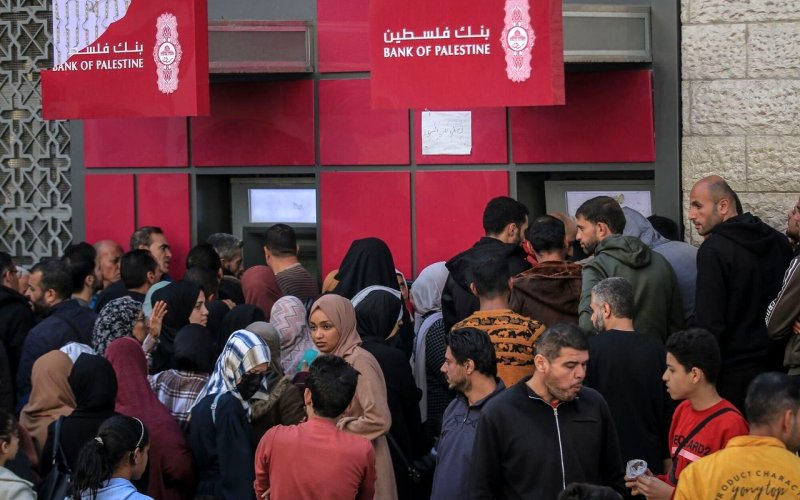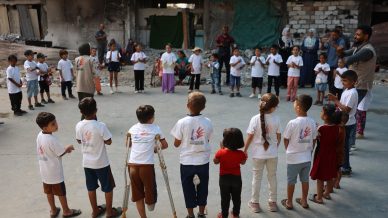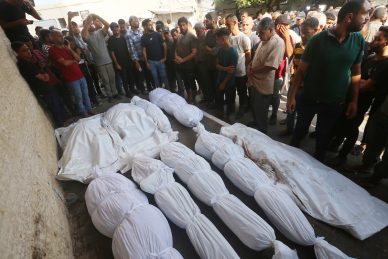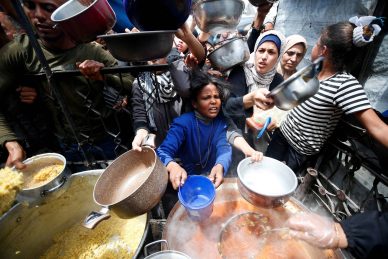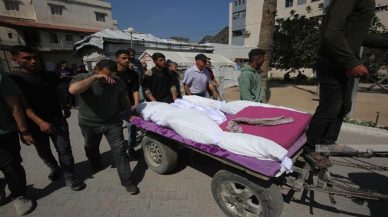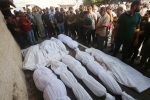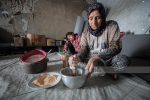GAZA, (PIC)
“For the past two months, I’ve been struggling immensely to obtain money to provide for my family’s basic needs and secure the essentials for living, due to the severe cash shortage in the markets,” said Bilal Ibrahim to the Palestinian Information Center (PIC). His complaint highlights just a small part of the “cash shortage crisis” that Israel has sought to turn into one of the harshest tools of collective punishment against the people of Gaza amidst the ongoing genocide.
Ibrahim confirms that “the economic conditions have become extremely dire for most Palestinian families due to the cash shortage and the difficulty in accessing money, with high fees imposed by money changers.” He notes that at the beginning of the war on Gaza, the money changers were charging a fee of 1-2% at worst, but this percentage gradually increased, reaching 20% by the end of April this year.
Cash shortage as a tool for destroying livelihoods in Gaza
Since the beginning of its aggression on Gaza on October 8, 2023, the Israeli occupation forces have sought to destroy all aspects of life. High-level political statements have dehumanized the residents of Gaza. As part of their attempt to exterminate the population or force them to leave, they have employed various means, policies, and procedures to undermine the residents’ ability to survive.
The Al Mezan Center confirms in a recent report that this crisis has become one of the tools used by Israel to cripple the banks’ ability to provide financial services to the public. This is part of the genocide, with the occupation authorities preventing the necessary cash, especially the Israeli shekel (the main currency in the occupied Palestinian territories), from reaching the banks. As a result, they have created an unprecedented cash shortage crisis in Gaza.
This cash shortage directly impacts the population, exacerbating daily challenges and preventing them from withdrawing their money from banks, whether it’s salaries, savings, or funds sent by relatives and friends abroad.
Targeting the banking system
Since the start of the Israeli aggression on Gaza, Israel’s Finance Minister Bezalel Smotrich stated in a tweet on his X account that he refuses to transfer tax revenues to the Palestinian Authority until further notice. He also said he would not renew the licenses for banks dealing with Palestinian Authority banks. According to the geographical distribution by the Palestinian Monetary Authority, there are 10 banks, 56 branches and offices, and 84 ATMs operating in Gaza.
In a press statement issued in the first week of May, the Palestinian Monetary Authority noted that there are no official statistics on the partial and total damages inflicted on the banking sector in Gaza. However, field data indicates that all branches and offices of Palestinian banks in Gaza and Northern Gaza have been out of service since the first day of the aggression.
Dr. Feras Milhem, Governor of the Palestinian Monetary Authority, said in a statement on May 5, 2024, that the challenges have worsened after most of the bank branches in Gaza were either partially or completely destroyed, rendering them out of service.
Cash shortage
According to Al Mezan Center, liquidity typically refers to the ability to quickly buy and sell assets in large quantities without incurring a significant loss in the asset’s price. Concerning financial instruments, liquidity refers to assets that can be quickly converted to cash without causing a significant loss in value, according to the UN ESCWA definition of liquidity.
While no cash has entered Gaza, money leaves the region through various transactions, such as covering travel expenses for many families who have left Gaza or commercial transactions like paying for consumer goods supplied by some traders.
High fees for cash
Due to the difficulty in accessing cash from ATMs or banks, Gaza residents resort to other means to obtain cash. Some are forced to receive their salaries through their bank cards in exchange for a “commission” from money changers or certain traders and wealthy individuals. This exposes residents to exploitation, resulting in a significant loss of their salary or money when receiving cash.
The shortage of cash and high commission rates create a barrier for institutions and individual initiatives attempting to assist vulnerable populations and alleviate the harsh living conditions.
Currency wear and tear
The accumulation of old, worn-out currency is expected amidst the cash shortage and lack of new currency entering Gaza since the war began. This situation points to a looming economic catastrophe that worsens daily, depriving citizens of meeting their basic needs.
The occupation forces are systematically destroying the banking system and tightening restrictions on the entry of cash as part of their collective punishment strategy within the ongoing genocide.
Al Mezan Center for Human Rights emphasizes that destroying essential resources for the population’s survival, including denying access to salaries and wages, undermines their ability to live and provide for essential needs.
International appeals
Al Mezan Center calls on the international community to pressure Israel to halt the genocide and implement an immediate ceasefire, compelling it, as an occupying force, to comply with the International Court of Justice’s rulings that imposed temporary measures to prevent genocide.
The Center also demands that the international community pressure the occupation state to allow the entry of money and cash into Gaza and release the clearing funds frozen by the Israeli Ministry of Finance.
It stressed the need to intensify international efforts to enable the relevant authorities to provide their services, reactivate banks and ATMs, and allow the entry of fuel and necessary equipment to operate them. This aligns with the International Court of Justice’s temporary measures to prevent irreversible economic and humanitarian damage.
The center also called on the Prosecutor of the International Criminal Court to prosecute Israeli officials and anyone who ordered the freezing of Gaza’s funds and the prevention of any money from entering the region.
Cash shortage warns of an economic disaster
On May 3, the Government Media Office (GMO) in Gaza confirmed that the lack of cash following the cessation of cash inflows in the region warns of a significant economic and financial disaster, as the occupation’s aggression enters its eighth consecutive month. It also called on the Palestinian Monetary Authority to reactivate the banks as much as possible.
Some residents rely on money sent by relatives through complex methods, paying high commissions and risking their lives to access it. The population in northern Gaza suffers from a severe cash shortage, with banking services halted since the start of the war.
The GMO stated that this problem is deepening in Gaza and northern Gaza, where all sources of cash have been completely shut down since the first day of the aggression. It said the suspension of banking services and the prevention of cash entry have made it impossible for employees to receive their salaries normally, forcing them to pay high commissions and paralyzing the purchasing movement in the markets. It has also prevented citizens from receiving money transfers from family and friends abroad.
It added that the most affected by this crisis are the most economically vulnerable groups, who have been unable to receive their allocations since the start of the aggression, such as social welfare beneficiaries, families of martyrs, the wounded, and prisoners. This situation calls for urgent humanitarian intervention, as these families have no other financial resources.

